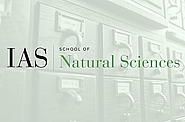Astrophysics Seminars
Sep
25
2025
Institute for Advanced Study Astrophysics Seminar
Testing general relativity and informing astrophysics with gravitational waves
11:00am|Bloomberg Lecture Hall
Sep
18
2025
Institute for Advanced Study Astrophysics Seminar
Dark matter, neutrinos, and cosmological concordance across scales
11:00am|Bloomberg Lecture Hall
May
15
2025
Institute for Advanced Study Astrophysics Seminar
Massive Black Holes on the Move: Mergers, Wanderers, and Observational Signatures from Simulations
11:00am|Bloomberg Lecture Hall
May
08
2025
Institute for Advanced Study Astrophysics Seminar
From Few-Body to Stellar Clusters: How Gas Reshapes Dynamical Evolution
11:00am|Bloomberg Lecture Hall
May
01
2025
Institute for Advanced Study Astrophysics Seminar
Large-scale feedbacks in collisionless shocks: the role of nonlinearities.TBA
Anatoly Spitkovsky
11:00am|Bloomberg Lecture Hall
Apr
24
2025
Institute for Advanced Study Astrophysics Seminar
Atmospheres as Probes of the Interiors and Formation pathways of super-Earth and sub-Neptune exoplanets
Hilke Schlichting
11:00am|Bloomberg Lecture Hall
Apr
17
2025
Institute for Advanced Study Astrophysics Seminar
Strongly Magnetized Black Hole Accretion Flows: Jets, Spin Evolution, and New Observational Probes
Angelo Ricarte
11:00am|Bloomberg Lecture Hall
Apr
10
2025
Institute for Advanced Study Astrophysics Seminar
Radiation and Magnetic Pressure Support in Accretion Disks around Supermassive Black Holes and The Physical Origin of Soft X-ray Excess
Yan-Fei Jiang
11:00am|Bloomberg Lecture Hall
Apr
03
2025
Institute for Advanced Study Astrophysics Seminar
Deep Generative Models for Bayesian Inference in Astrophysics
11:00am|Bloomberg Lecture Hall
Mar
27
2025
Institute for Advanced Study Astrophysics Seminar
Pushing towards cosmic dawn with the James Webb Space Telescope
Rachel Somerville
11:00am|Bloomberg Lecture Hall
